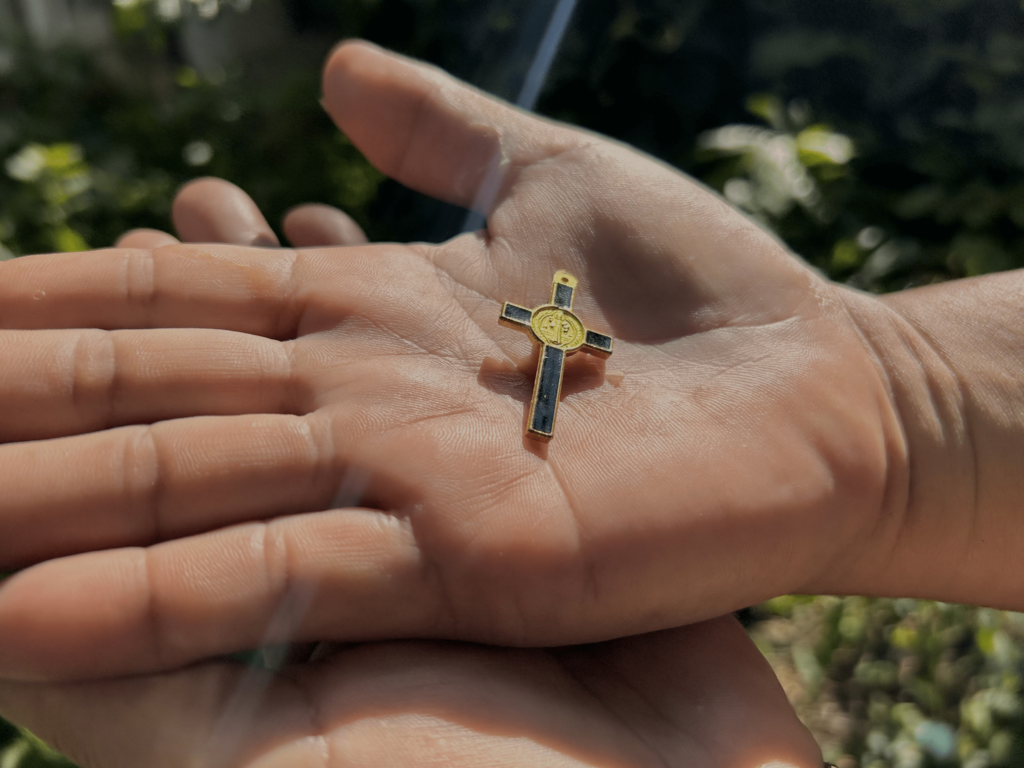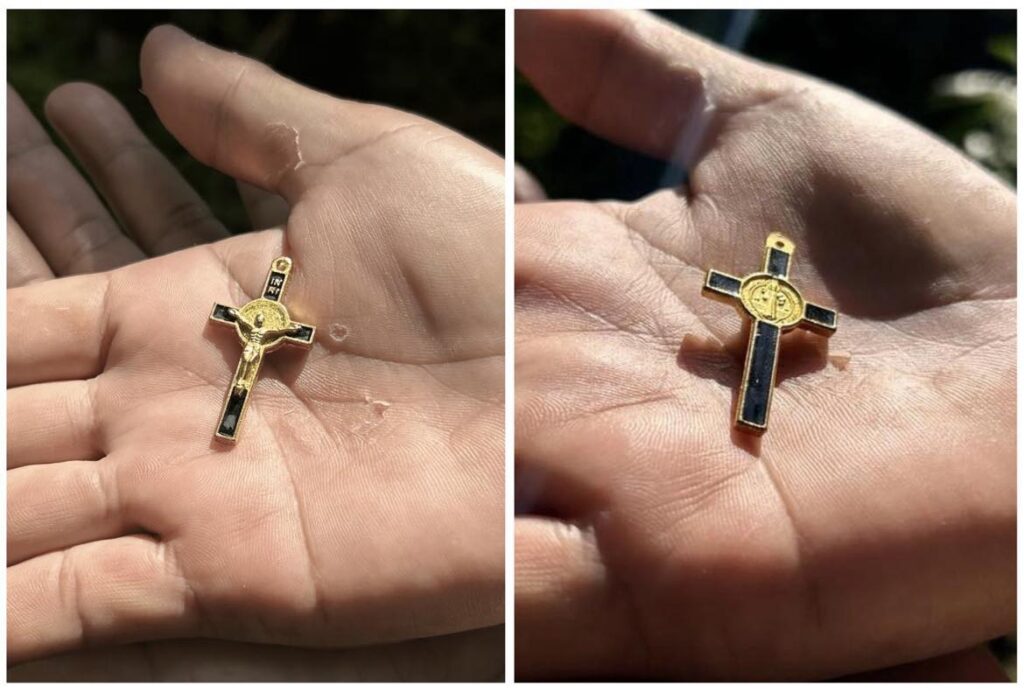Benedictine Medal and Kalag-Kalag : its importance, enduring protection
CONSOLACION, Cebu – As we commemorate our loved ones this Kalag-Kalag, our thoughts turn to the profound interconnectedness of life, death, and spirituality. In the midst of this contemplative season, there exists a timeless symbol, a tangible link to the divine and the supernatural that has spanned centuries, known as the Benedictine Medal.
This small yet mighty emblem has quietly persevered through the ebb and flow of human history, reminding us of the importance of faith, protection, and the pursuit of the divine in our lives. As we prepare to celebrate this year’s Kalag-Kalag and honor the memories of our loved ones, it is a fitting time to rekindle the profound purpose of the Benedictine Medal, recognizing its significance in fostering spiritual connections, granting solace, and offering protection, even from the supernatural forces in a world that can often seem chaotic and uncertain.
For this year’s Kalag-Kalag discussion, CDN-Digital, along with some of our dear friends from the Roman Catholic Church will delve into the rich history, symbolism, and the enduring importance of the Benedictine Medal in our modern lives.
READ: LIVE UPDATES: Kalag-Kalag or Undas 2023
The Story Behind the Benedictine Medal
For the purpose of releasing this content, CDN-Digital has invited two members of the Catholic Church to share with us their knowledge on the Saint Benedict Medal.
According to Fray Sol, not his real name, and a 25 year-old Cebuano seminarian, the Saint Benedict Medal stands as one of the most widely acknowledged symbols within the Catholic faith; tagging it as one of the “sacramentals” of the Catholic Church.

A version of the Benedictine Medal | Jessa Ngojo
Sacramentals
“According sa usa ka Church document (Sacrosanctum Concilium), sacramentals ‘signify effects, particularly of a spiritual nature, which are obtained through the intercession of the Church.’ They convey the spiritual gifts of God. Pero, compared sa mga (But compared to) sacraments, they do not contain the grace of God in themselves. They just prepare us in receiving God’s grace that we will receive through the seven sacraments of the Church,” Fray Sol explained in a brief interview with CDN- Digital.
Fray Sol also noted that the St. Benedict medal itself does not inherently contain the grace of God. Instead, it bolsters our faith and belief that God watches over us, safeguarding us from evil when we wear or display it.
“We invoke St. Benedict not because he is the one who shields us from evil. It is God himself who protects us; St. Benedict communicates our petition to God, since he is closer to God. The sacraments have to take precedence over the sacramentals. This means nga mas maayo kung mangayo ta sa simbahan sa mga sacraments (that it is better to ask for the sacraments at the church). We should attend Mass, so that we can celebrate and witness God’s love to us. We should believe in the power of confession. We should not only rely on the sacramentals. This is what the catechesis of the Church teaches us,” Fray Sol said this as a reminder to us.
READ: Cebu Catholic Church priest urges faithful to wear saintly attires not scary costumes
Benedictine Medal: It’s link to protection from evil
According to Gretchen Filz, a Dominican Lay and a writer for the Catholic Company, that during St. Benedict’s lifetime, he was renowned for performing numerous miracles, often attributed to the Holy Cross. These included resisting temptations, escaping deadly traps, and famously neutralizing a poisoned cup by making the Sign of the Cross over it. The Medal of St. Benedict is rooted in this tradition of his ability to thwart the Devil’s schemes.
As per Father Bee, not his real name, a member of the Archdiocese of Cebu Office of Deliverance and Exorcism (ACODE), accredited priests in exorcizing utilize sacramentals, including the St. Benedictine Medal, in their rituals.
While acknowledging the assistance provided by the St. Benedictine Medal in their ministry, he suggests that it may not be the most potent tool at their disposal.
“In exorcism and deliverance sessions we use several sacramentals (such as blessings/prayers, rosaries, crucifix, holy water, exorcised salt, or oil, etc. – that includes the medal of St. Benedict, and we don’t claim it is the most effective among the sacramentals,” he further said.

The front and back of the Benedictine Medal | Jessa Ngojo
Kalag-Kalag: Flowers, mananabtan, Dakong Krus in Calamba Cemetery
Not most potent tool in exorcising
Fray Sol, on a different interview, also expressed that the popularity and the beliefs of “antings-antings” and other medals by our ancestors brought about by here in Cebu may also affect the views of the Cebuanos to the mentioned sacramental; which can be linked as to why Father Bee claims why it is not the most potent tool in exorcising.
“Every time I go to religious stores, makit-an jud nako permi ang mga Benedictine medals (in all sizes). So, I assume nga most Cebuanos got to know about the St. Benedict medal in these places. Siguro, giingnan sila sa tigbantay nga pangpanalipod sa evil spirits ang mga Benedictine medals. Owing from our history, I can say nga related ni sya sa atong precolonial beliefs. Our ancestors used to believe (others in the present still do) in amulets nga naay special powers. Siguro, ingon ana pud ang tan-aw sa mga tawo aning mga butanga” Fray Sol said.
(Every time I go to religious stores, I can always see Benedictine medals (in all sizes). So, I assume that most Cebuanos got to know about St. Benedict medal in these places. Perhaps, they were told by the store watcher that the Benedictine medals is the guardian who protects us from evil spirits. Owing from our history, I can say that this is related to our precolonial beliefs. Our ancestos used to believe (others in the present still do) in amulets that they have special powers. Perhaps, that is also how people look at this thing.)
Using sacramentals
In a different interview, Father Bee also issues a reminder and a caution regarding the use of these sacramentals. He emphasizes the importance of the holder or user maintaining a pure intention to achieve the most positive and serene outcomes.
“Contrary to talisman, anting anting, amulets, occult orasyon or incantations, etc., all sacramentals, including the medal of St. Benedict do not carry magical powers. Although there are some occult practitioners who distort or misuse our traditional sacramentals such as images of the saints. Good or bad harvests highly depend on the intentions and motives of the Sower,” he said.
READ: Argao student: I saw a huge black person, then I was possessed by evil spirit
The ‘supernatural’ and Kalag-Kalag
When asked about the topic on where Cebuanos should be cautious about the supernatural this Kalag-Kalag, Father Bee emphasized that Cebuanos should not only be cautious during the Kalag-Kalag season, but should be cautious 24/7.
“The devil works anytime,” said Father Bee.
“In Catholic tradition, all Saints’ Day and Souls’ day are considered Holy days. These are days of remembering the triumphant faithful (the saints) and the faithful departed men and women. The attack of the evil one is 24/7, the devil works anytime to destroy the natural or the created world. I don’t believe that every November 1 and 2 only, that the evil spirits are more active, this is superstition equivalent to the claim that “on Black Saturdays, evil lurks active because Jesus is dead!” Fr. Bee said.
Cebuanos on the Benedictine Medal
As someone who is a part of the younger generation of Cebuanos, and a part of the Church as well, Fray Sol sends his message to his generation on having knowledge on the importance of Sacramentals.
“I (will) say it again: Do not forget about the faith that you were baptized into. You can express your faithfulness to God by going to mass and receiving the communion on Sundays, going to confession (at least once a year), praying to God regularly, and using the sacramentals to strengthen your faith,” Fray Sol reminds the younger Cebuano generation.
READ: Why All Saints’ Day and All Souls’ Day are celebrated
‘Cemeteries are not dumpsites, they are holy grounds’ – Fr. Bee
With his last messages to the Cebuanos who will celebrate Kalag-Kalag this year, Fr. Bee reminds us that in celebrating our departed loved ones, we must not only continue this tradition just because of the repercussions we might receive from our loved ones on the other side if we don’t follow, but also in honoring our religious belief and faith.
“We go to the cemeteries not because of the superstitious belief that the spirit of our dead will visit us in our homes if we don’t. Or simply our tradition (naandan [the ones that we are used to]?) or culture, but we deeply respect the holy place where our departed are now temporarily rested. Catholics should remember that cemeteries are not dumpsites, they are holy grounds, a place to celebrate and express our religious faith in the afterlife!,” Fr. Bee said.
Continuous prayers for departed loved ones
Fray Sol also delivers a message to all Cebuanos this Kalag-Kalag, stressing the significance of upholding the tradition of continuous prayers for both our departed loved ones and the living.
“Continue praying for the salvation of the souls of your loved ones. You can even do more by offering masses for their repose and the repose of the poor souls in Purgatory. In the Catholic Church, we believe in the communion of saints. We even declare it in the Creed. […] The Church believes that we are praying for each other: we, the living, pray for ourselves and for the suffering souls, while the saints intercede for us to God. This shows that praying (from celebrating the Eucharist to our personal prayers) keeps our Church alive.”
Disclaimer: The comments uploaded on this site do not necessarily represent or reflect the views of management and owner of Cebudailynews. We reserve the right to exclude comments that we deem to be inconsistent with our editorial standards.
